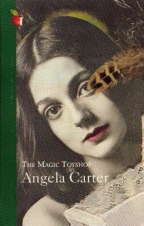The Magic Toyshop
Angela Carter
Virago Press
UK Mass Market Paperback
ISBN: 0860681904
Publication Date: 08-27-92 [Originally Published in 1967]
204 Pages; £6.00
Review Date: 02-01-2003
Reviewed by: Serena Trowbridge © 2003

REFERENCES
COLUMNS
|
|
|
The Magic ToyshopAngela CarterVirago PressUK Mass Market PaperbackISBN: 0860681904Publication Date: 08-27-92 [Originally Published in 1967]204 Pages; £6.00Review Date: 02-01-2003Reviewed by: Serena Trowbridge © 2003 |
|
|
REFERENCES |
COLUMNS |
Angela Carter's fiction has been described in the terms of many genres, from magic realism to Gothic and feminism. As a child she grew up surrounded by strong women and throughout her life she wrote about strong, characterful women in varying guises. Her work undergoes a shift in emphasis, however from, 'The Magic Toyshop' (1967) to 'The Passion of New Eve' (1977). Although ten years separate these novels, they are both as like and unlike as possible; her characteristics as a writer, such as the magical grotesquerie and menacing fantasies she plays with, are present in both, but her characterization changes and her tone strengthens in the intervening period.
The Magic Toyshop opens as an exercise in fey, sweet childhood; Melanie is on the brink of becoming a young woman, and as she delights in her own realness, it seems that this may be another unmemorable coming-of-age novel. This illusion is quickly dispelled, however; this novel has disturbing elements, which are sometimes peripheral and are suddenly thrust unavoidably under our noses.
The story follows young Melanie, living in comfort with her siblings Victoria and Jonathan, until their parents are killed and they have to live with their uncle, Philip, a toy maker, his silent wife, Margaret and her two younger brothers, Finn and Francie. The characterization of this novel has been criticized, but it is for this strength that it has become a subsidiary A-level text in the UK, and deservedly so. The characters are complex and yet simple: each has their own paradox. Childish, unsure Melanie is growing up, and is shattered out of her adolescent reverie; speechless Margaret has so much to say but can only write it down; Philip who makes toys for children does so for his own gratification and dislikes children; and Finn, to whom Melanie is unexpectedly attracted, is portrayed as filthy and ugly.
The novel is tightly structured, with several points that can be identified as crises, although the structure of the novel is hidden and padded by a lyricism suited to the characters. These crises are always unexpected and, although apparently commonplace, in context can send a shiver down the spine. The most remarkable of these is perhaps the performances of Uncle Philip's puppet theatre, in which the puppets seem to represent Melanie's own experiences as well as enacting her specific fears.
In retrospect it becomes clear that the crisis points in fact precede an event of far greater significance, which keeps the reader ever watchful and the characters always interesting, particularly as the story develops and the motivations and instigations of their actions is revealed. Towards the end of the novel Melanie begins to understand the strength of her aunt, living under the shadow of her towering husband, and she begins to despair of her own fate, seeing a bleak yet oddly comforting future with Finn. Melanie is always at the whim of men; Finn kisses her when he wants to; Uncle Philip frightens and disturbs her, and finally she breaks with the toy maker's house, but not without Finn to inspire her and accompany her.
The actions and reactions of the characters can be predicted, which makes it hard to describe the remarkable allure of the story, with its fairytale motifs and familiar images. The sense of unease which pervades the novel, with the grotesque and sometimes frightening toys hovering in the background, heightens the senses of the reader and both unsettles and delights.